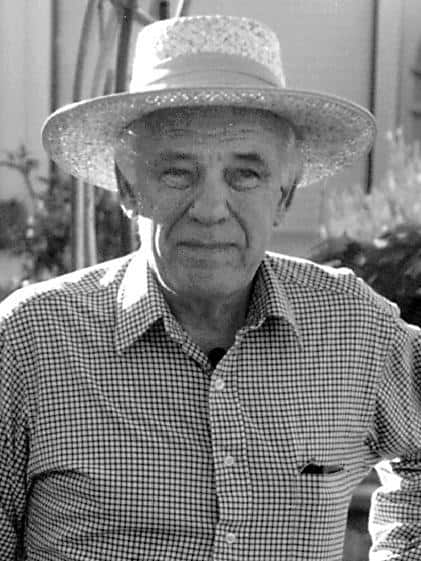"To be economical, agriculture must be ecological."
This, from Acres U.S.A. founder Charles Walters, has been our guiding principle since 1971.

The son of poor Kansas farmers, Walters’ childhood was marked first by the Dust Bowl and then by the Great Depression. He served in the military in World War II and earned a master’s degree in economics on the G.I. Bill, eventually settling in Kansas City, Missouri. Walters never lost his connection to the world of farming. He took notice when American farmers entered into an expensive new dependence on supercharged fertilizers and powerful new pesticides — about which little was known.
Rachel Carson’s Silent Spring — a devastating attack on DDT and other agricultural chemicals — became a cornerstone of the unique point of view Walters would bring to Acres U.S.A. Equally crucial was his experience as an editor for the National Farmer’s Organization (NFO), a group dedicated to the idea of using collective bargaining to obtain a better deal for the family farmer.
Walters left NFO and founded Acres U.S.A. in 1971. The publication immediately attracted a number of fascinating figures, all of whom were devoted to the idea that the more disconnected agriculture became from nature, the more destructive it was — for the soil, for human health and for the environment. Ecologically minded farmers, soil scientists, farm policy experts, economic thinkers, insect researchers, philosophers of the land — Walters began interviewing them, commissioning articles by them, and inviting them to speak at the annual conference he began in 1975.

From the 1986 Eco-Ag Conference, Charles Walters, the founder of Acres U.S.A., gave his cornerstone talk, “Chemical Amateurs vs. Eco-Farmers,” in which he argued that the burden of proof – certification, licensing, etc. – should be on those taking shortcuts via synthetic chemicals. Those who honor and regenerate the land should have freer access to markets.
Perhaps the most important person Walters encountered and helped popularize was Dr. William Albrecht, a University of Missouri professor whose low profile obscured decades of brilliant work in soil science. Albrecht’s papers, which Walters rescued from the historical dustbin and published in several volumes, provided a rock-solid foundation for this new, scientific approach to ecological farming.
Walters authored over a dozen books over the several decades he edited Acres U.S.A., both as author and co-author, and the company became a publisher of a number of important books on ecological farming. Besides the Albrecht volumes, these include Don Schriefer’s innovate books on row cropping (From the Soil Up and Agriculture in Transition), Neal Kinsey’s Hands-On Agronomy, Arden Anderson’s Science in Agriculture, and, more recently, Gary Zimmer’s The Biological Farmer and Advancing Biological Farming as well as Mark Shepard’s best-selling Restoration Agriculture. Acres U.S.A. has published over a hundred titles in the past fifty years, many of which remain important aids to farmers and ranchers looking to implement practices that more closely align with nature.
After many decades of faithful service, Charles Walters handed over control of the magazine, conference and book publishing efforts to his son, Fred. The company changed hands again in 2016 when it was purchased by Swift Corporation (now Questor).
While in many ways the agricultural landscape in North America looks very similar to how it did in 1971 — there is still widespread use of synthetic herbicides and pesticides, and many other practices that are destructive to the soil — it has become increasingly clear in the past decade that change is afoot. More and more growers and farming organizations — and the consumer population in general — are using and advocating practices that seek to restore the soil and reduce the use of costly synthetic inputs. The principles of regenerative agriculture — using cover crops to feed soil biology and to keep the soil covered, the integration of livestock and the establishment of plant and microbiological diversity — are becoming mainstream.
It is impossible to know the extent to which Acres U.S.A. led this transformation toward ecological agriculture, but we’d like to think that we played a key role in this revitalization of common-sense farming! Acres U.S.A.’s educational products — which still include our magazine, books and conference, but are now supplemented with online courses, webinars, podcasts and white papers — will continue to help growers farm more in tune with nature, and thus more profitably. We remain as committed as ever to our core mission: supporting ecological agriculture by doing our best to highlight the insights of farmers, researchers and agronomists who are demonstrating how ecological agriculture is, in fact, more economical.

